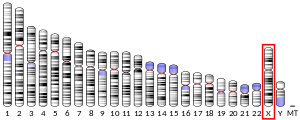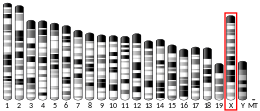Sodium/hydrogen exchanger 6 is an integral membrane protein that in humans is encoded by the SLC9A6 gene. It was originally thought to be a mitochondrial-targeted protein, but subsequent studies have localized it to the plasma membrane and recycling endosomes.[5][6][7][8]
See also
edit- SLC9A6+protein,+human at the U.S. National Library of Medicine Medical Subject Headings (MeSH)
References
edit- ^ a b c GRCh38: Ensembl release 89: ENSG00000198689 – Ensembl, May 2017
- ^ a b c GRCm38: Ensembl release 89: ENSMUSG00000060681 – Ensembl, May 2017
- ^ "Human PubMed Reference:". National Center for Biotechnology Information, U.S. National Library of Medicine.
- ^ "Mouse PubMed Reference:". National Center for Biotechnology Information, U.S. National Library of Medicine.
- ^ Numata M, Petrecca K, Lake N, Orlowski J (Mar 1998). "Identification of a mitochondrial Na+/H+ exchanger". The Journal of Biological Chemistry. 273 (12): 6951–9. doi:10.1074/jbc.273.12.6951. PMID 9507001.
- ^ Brett CL, Wei Y, Donowitz M, Rao R (May 2002). "Human Na(+)/H(+) exchanger isoform 6 is found in recycling endosomes of cells, not in mitochondria". American Journal of Physiology. Cell Physiology. 282 (5): C1031–41. doi:10.1152/ajpcell.00420.2001. PMID 11940519.
- ^ Deane EC, Ilie AE, Sizdahkhani S, Das Gupta M, Orlowski J, McKinney RA (Jan 2013). "Enhanced recruitment of endosomal Na+/H+ exchanger NHE6 into Dendritic spines of hippocampal pyramidal neurons during NMDA receptor-dependent long-term potentiation". The Journal of Neuroscience. 33 (2): 595–610. doi:10.1523/JNEUROSCI.2583-12.2013. PMC 6704919. PMID 23303939.
- ^ Ohgaki R, Matsushita M, Kanazawa H, Ogihara S, Hoekstra D, van Ijzendoorn SC (Apr 2010). "The Na+/H+ exchanger NHE6 in the endosomal recycling system is involved in the development of apical bile canalicular surface domains in HepG2 cells". Molecular Biology of the Cell. 21 (7): 1293–304. doi:10.1091/mbc.E09-09-0767. PMC 2847532. PMID 20130086.
- ^ "Angelman Syndrome - NORD (National Organization for Rare Disorders)". NORD (National Organization for Rare Disorders). 2015. Retrieved 28 April 2017.
Further reading
edit- Brett CL, Wei Y, Donowitz M, Rao R (May 2002). "Human Na(+)/H(+) exchanger isoform 6 is found in recycling endosomes of cells, not in mitochondria". American Journal of Physiology. Cell Physiology. 282 (5): C1031–41. doi:10.1152/ajpcell.00420.2001. PMID 11940519.
- Cheng J, Moyer BD, Milewski M, Loffing J, Ikeda M, Mickle JE, Cutting GR, Li M, Stanton BA, Guggino WB (Feb 2002). "A Golgi-associated PDZ domain protein modulates cystic fibrosis transmembrane regulator plasma membrane expression". The Journal of Biological Chemistry. 277 (5): 3520–9. doi:10.1074/jbc.M110177200. PMID 11707463.
- Miyazaki E, Sakaguchi M, Wakabayashi S, Shigekawa M, Mihara K (Dec 2001). "NHE6 protein possesses a signal peptide destined for endoplasmic reticulum membrane and localizes in secretory organelles of the cell". The Journal of Biological Chemistry. 276 (52): 49221–7. doi:10.1074/jbc.M106267200. PMID 11641397.
- Numata M, Orlowski J (May 2001). "Molecular cloning and characterization of a novel (Na+,K+)/H+ exchanger localized to the trans-Golgi network". The Journal of Biological Chemistry. 276 (20): 17387–94. doi:10.1074/jbc.M101319200. PMID 11279194.
- Nagase T, Seki N, Ishikawa K, Ohira M, Kawarabayasi Y, Ohara O, Tanaka A, Kotani H, Miyajima N, Nomura N (Oct 1996). "Prediction of the coding sequences of unidentified human genes. VI. The coding sequences of 80 new genes (KIAA0201-KIAA0280) deduced by analysis of cDNA clones from cell line KG-1 and brain". DNA Research. 3 (5): 321–9, 341–54. doi:10.1093/dnares/3.5.321. PMID 9039502.
This article incorporates text from the United States National Library of Medicine, which is in the public domain.




